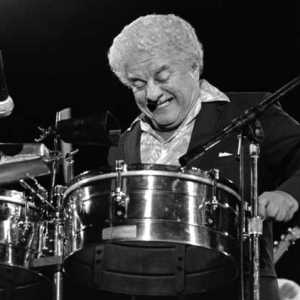Tito Puente, Latin jazz Artist

Tito Puente (April 20, 1923 – May 31, 2000)
Tito Puente was a musician, songwriter and record producer. He is often credited as “The Musical Pope”, “El Rey de los Timbales” (The King of the Timbalis) and “The King of Latin Music”. He is best known for dance-oriented mambo and Latin jazz compositions that endured over a 50-year career. He and his music appeared in many films such as “The King Mambo” and “Fernando Trueba’s Calle 54”. He guest-starred on several television shows, including Sesame Street and The Simpsons two-part episode “ Who Shot Mr. Burns”. Tito’s most famous song is “Oye Como Va”.
During the 1950s, Puente was at the height of his popularity, and helped to bring Afro-Cuban and Caribbean sounds like mambo, son, and cha-cha-chá, to mainstream audiences. Puente was so successful playing popular Afro-Cuban rhythms that many people mistakenly identify him as Cuban. “Dance Mania”, possibly Puente’s most well-known album, was released in 1958.
Born: New York City, New York, USA
Genre: Latin jazz, Afro-Cuban Jazz, Mambo
Tito Puente was born on April 20, 1923, in the New York borough of Manhattan. His family moved frequently, but he spent the majority of his childhood in the Spanish Harlem area of the city. As a child, he was described as hyperactive, and after neighbors complained of hearing seven-year-old Puente beating on pots and window frames, his mother sent him to 25-cent piano lessons. By the age of 10, he switched to percussion, drawing influence from jazz drummer Gene Krupa. He later created a song-and-dance duo with his sister Anna in the 1930s and intended to become a dancer, but an ankle tendon injury prevented him pursuing dance as a career. When the drummer in Machito’s band was drafted to the army, Puente subsequently took his place.
Puente served in the Navy for three years during World War II after being drafted in 1942. He was discharged with a Presidential Unit Citation for serving in nine battles on the escort carrier USS Santee (CVE-29). The GI Bill allowed him to study music at the Juilliard School of Music, where he completed a formal education in conducting, orchestration and theory.
During the 1950s, Puente was at the height of his popularity, and helped to bring Afro-Cuban and Caribbean sounds like mambo, son, and cha-cha-chá, to mainstream audiences. Puente was so successful playing popular Afro-Cuban rhythms that many people mistakenly identify him as Cuban. “Dance Mania”, possibly Puente’s most well-known album, was released in 1958.
Among his most famous compositions are mambo “Oye como va” (1963), popularized by Latin rock musician Carlos Santana and later interpreted, among others, by Julio Iglesias, Irakere and Celia Cruz.
In 1969, he received the key to the City of New York from former Mayor John Lindsay. In 1992, he was inducted into the National Congressional Record, and in 1993 he received the James Smithson Bicentennial Medal from the Smithsonian.
In early 2000, he appeared in the music documentary Calle 54. After a show in Puerto Rico on May 31, 2000, he suffered a massive heart attack and was flown to New York City for surgery to repair a heart valve, but complications developed and he died on May 31, 2000. He was posthumously awarded the Grammy Lifetime Achievement Award in 2003.
Biographical information courtesy of Wiki; for more reading see link below.
https://en.wikipedia.org/wiki/Tito_Puente
